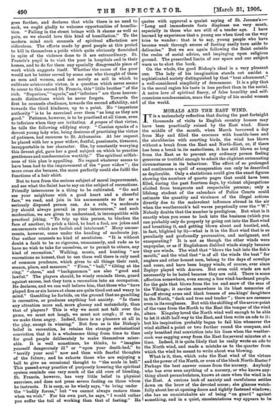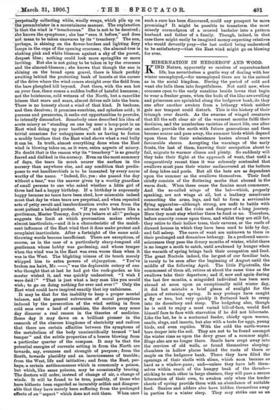MORALS AND THE EAST WIND.
IT is a melancholy reflection that during the past fortnight thousands of visits to English country houses may have been practically ruined by the East wind. Since the middle of the month, when March borrowed a day from May and filled the crocuses with bumble-bees and the shrubberies with courting birds, the wind has blown without a break from the East and North-East, or, if there has been a break in its easterliness, it has still blown so long from the East as to prevent any ordinary person feeling generous or truthful enough to admit the slightest extenuating circumstances in its behaviour. The effect of so prolonged and continuous a spell of exasperation can only be described as deplorable. Only a statistician could give the exact figures showing the numbers of quarto pages that could have been filled, during the past fourteen days, by violent objurgations elicited from temperate and respectable persons ; only a lifelong student of the calendars of Police Courts could estimate the quantity and virulence of the illegal actions directly due to the malevolent influence abroad in the air when the weathercock's tail waves perpetually over the "W." Nobody doubts that the number is prodigious. But what is it exactly when you come to look into the business (which you can probably only do properly by going out into the East wind and breathing it, and getting blown about and hustled, and, in fact, blighted by it)—what is it in the East wind that is so peculiarly and profoundly provocative, and malignant, and exasperating ? It is not as though the other winds were unpopular, or as if Englishmen disliked winds simply because they are winds. The wind that "blows the bait into the fish's mouth," and the wind that "is of all the winds the beat" for anglers and other honest men, belong to the days of cowslips and roses, and have been happy winds, of course, ever since• Zephyr played with Aurora. But even cold winds are not necessarily to be hated because they are cold. There is some affection somewhere, even among a less wind-hardened peoples for the gale that blows from the ice and snow of the seas of the Vikings; it carries somewhere in its blast memories of far-off strong arms and black tresses of sea-kings' daughters in the North, "dark and true and tender " ; there are caresses even in its roughness. But with the shifting of the arrow-point of the vane from the North to the East the temper of the wind alters. Kingsley loved the North wind well enough to be able to let it shift half-way to the East, and then write an ode to it; but his inspiration probably began to fail him whenever the wind shifted a point or two further round the compass, and only breathed real conviction into his lines when the weather- cock was sagging away from the East for.several minutes at a time. Indeed, it is quite likely that he really wrote an ode to the North wind, and made a mistake as to the quarter from which the wind he meant to write about was blowing.
What is it, then, which robs the East wind of the virtues and the power of the North, or even of the black North-Easter ? Perhaps the best answer comes from the nursery. Anybody who has ever seen anything of a nursery, or who knows any- thing about perambulators, knows at once when the wind is in the East. A curious look of anxiety and carefulness settles down on the brow of the devoted nurse; she glances watch- fully about her at opening doors and tightly fastened windows; she has an unmistakable air of being "on guard" against something, and in a quiet, unostentatious way appears to be perpetually collecting white, woolly wraps,. which pile up on the perambulator in a mountainous manner. The explanation is that the wind is "treacherous." She is not to be deceived ; she knows the symptoms ; she has "seen it before," and does not mean to be taken unawares by its "treachery." The sun, perhaps, is shining on the flower-borders and lighting fiery lamps in the cups of the opening crocuses ; the almond-tree is shaking pink and white blossom against a sky of the purest, deepest blue; nothing could look more springlike or more inviting. But she is not going to be taken in by the crocuses and the almond-blossom ; she knows that though the sun is shining on the broad open gravel, there is black perfidy awaiting behind the protecting bank of laurels at the corner of the drive where the wind comes straight over the field from the bare ploughed hill beyond. Just there, with the sun hot on your face, there comes a sudden buffet of hateful keenness ; not the boisterous, cold wetness of the North, but a razorlike iciness that sears and scars, almost drives salt into the burn. There is no honesty about a wind of that kind. It beckons, and then deceives; it promises sunshine, and splashes acid ; it pursues and persecutes, it seeks out opportunities to provoke, to intensify discomfort. Somebody once described his idea of acute misery as "standing on one leg near a lamp-post in an East wind doing up your bootlace," and it is precisely on trivial occasions for unhappiness such as having to fasten a muddy bootlace that the East wind shows what a real bully it can be. In truth, almost everything done when the East wind is blowing takes on, as it were, extra aspects of misery. No doubt that is the reason why its " treachery " is so greatly feared and disliked in the nursery. Even on the most summery of days, the tears lie much nearer the surface in the nursery than anywhere else, and any condition that predis- poses to wet handkerchiefs is to be lamented by every nurse worthy of the name. "Indeed, Sir, yes : she passed the day without a tear," was the answer given by a worthy guardian of small persons to one who asked whether a little girl of three had had a happy birthday. If a birthday is supremely happy because no tears have been shed, how miserable indeed must that day be when tears are perpetual, and when repeated acts of petty revolt and insubordination evoke even from the most patient a belated protest. "If you can't behave like a gentleman, Master Tommy, don't you behave at all!" perhaps suggests the limit at which provocation makes rebuke almost inarticulate,—and it is a characteristic of the malefi- cent influence of the East wind that it does make protest and complaint inarticulate. After a fortnight of the same acid- throwing words become insufficient. There are exceptions, of course, as in the case of a particularly sharp-tongued old gentleman whose hobby was gardening, and whose temper when the wind was in the East was even worse than when it was in the West. The blighting iciness of its touch merely whipped him to extra powers of objurgation. "You've broken ma hairt, Mr. —," was the deplorable outcry of one who thought that at last he had got the rock-garden as his master wished it, and was quickly undeceived. "I wish I were deid!" "That is just what a lazy man like you would wish; to go on doing nothing for ever and ever !" Only the East wind could have inspired exactly that icy unfairness.
It may be that for the inability to keep a proper mental balance, and the general subversion of moral perceptions induced by the persecution of the wind setting in from cold seas over a land of sunshine, the doctors may some day discover a real reason in the theories of medicine. Some day it may dawn on a brilliant pioneer in the research of the obscure kingdoms of electricity and radium that there are certain affinities between the symptoms of the metabolism of the body unscientifically termed "bad temper" and the subtle properties of a breeze blowing from a particular quarter of the compass. It may be that the potential energies of currents setting in from the North are towards, say, evenness and strength of purpose ; from the South, towards placidity and an incuriousness of trouble; from the West, life and initiative; and from the East, per- haps, a certain nettlesomeness which is commonly a poison, but which, like some poisons, may be occasionally bracing. The doctors will order, instead of change of air, a change of winds. It will be found to be true, possibly, of those who have hitherto been regarded as incurably selfish and disagree- able that they have merely been suffering from the prolonged effects of an" aspect" which does not suit them. When once such a cure has been discovered, could any prospect be more promising? It might be possible to transform the most miserly curmudgeon of a crusted bachelor into a pattern husband and father of a family. Though, indeed, in that case there might easily be imagined money-expecting relatives who would devoutly pray—the last codicil being understood to be satisfactory—that the East wind might go on blowing for ever.











































 Previous page
Previous page